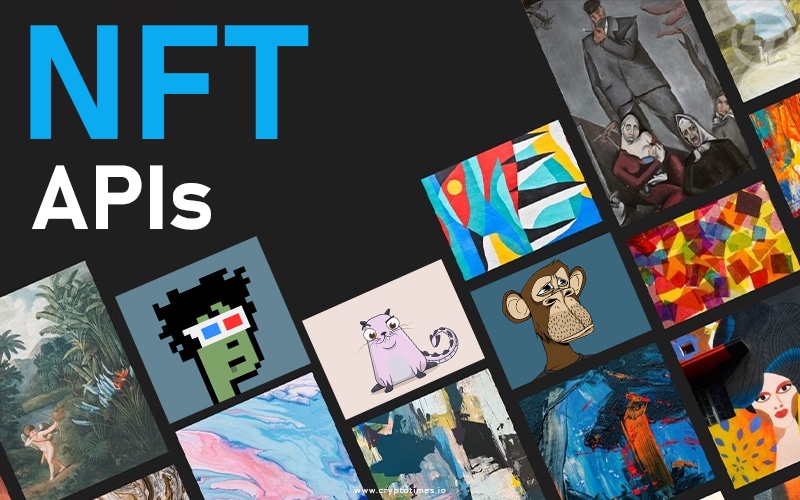In the dynamic realm of digital assets, the exponential rise in popularity of non-fungible tokens (NFTs) has heralded a new era of digital ownership and asset exchange. With this surge comes an escalating demand for efficient access to NFT data and affordable indexing platforms, a need that is becoming increasingly crucial in the digital asset space.
At the heart of meeting this demand are NFT APIs, which serve an integral function in equipping developers with the necessary tools to navigate the intricate blockchain networks that power NFTs. These APIs not only facilitate a deeper understanding of blockchain intricacies but also unlock a spectrum of possibilities for innovative digital asset management and enhanced user engagement.
This article embarks on an exploratory journey into the world of NFT APIs, shedding light on their pivotal role and offering insights into how they empower users to effectively harness the rich data of NFTs.
Understanding NFT APIs
At their core, Application Programming Interfaces (APIs) for non-fungible tokens (NFTs) serve as the vital link between the intricate world of blockchain technology and the applications that bring digital assets to life. These APIs act as conduits, allowing seamless communication and data exchange between decentralized blockchain networks and various software platforms.
Imagine a developer aiming to create an interactive digital art gallery; by utilizing an NFT API, they can effortlessly fetch detailed information about each art piece, such as its provenance, current ownership, and transaction history, directly from the blockchain. This capability not only simplifies the complexity inherent in blockchain interactions but also opens up a myriad of opportunities for creative and practical applications.
From real-time updates on NFT transactions to accessing rich metadata, NFT APIs provide the essential toolkit for developers to innovate, build, and expand the burgeoning landscape of digital assets. By bridging the gap between blockchain technology and user-friendly applications, NFT APIs are the cornerstone of modern NFT platforms, enabling a diverse range of functionalities and paving the way for the next wave of digital asset innovation.
Also Read: Cryptocurrency APIs for Trading and Exchange
Accessing NFT Data through APIs
The key to unlocking the vast potential of NFTs lies in the ability to access and interpret their underlying data. This is where NFT-specific APIs become indispensable. Tailored to cater to the unique attributes of non-fungible tokens, these APIs provide an array of endpoints, enabling developers to query detailed information about individual NFTs.
This includes data on ownership, transaction history, and the rich metadata that defines each token’s uniqueness. For instance, on platforms like Ethereum, renowned for their extensive use in the NFT marketplace, APIs offered by services such as OpenSea and Rarible allow for direct interaction with the blockchain to fetch NFT data.
Developers can make structured HTTP requests to these APIs, retrieving crucial information such as the token’s current owner, its metadata, and its entire transaction history. This process not only facilitates a deeper understanding of the NFT’s journey and value but also simplifies what would otherwise be a complex interaction with blockchain technology. By providing streamlined access to this data, NFT APIs play a pivotal role in enabling developers to craft applications that are both innovative and responsive to the ever-changing landscape of the digital asset world.
Utilizing NFT Data Effectively
With NFT data accessible, developers can harness it in various innovative ways:
- Marketplace Integration: NFT data integration in digital marketplaces offers real-time pricing, availability, and ownership history, enhancing transparency and transaction smoothness.
- Portfolio Tracking: NFT enthusiasts can track their digital asset portfolios through tools powered by NFT APIs, analyzing performance and historical data to inform buying or selling decisions.
- Content Curation: Utilizing NFT metadata, developers can curate thematic galleries, enabling users to discover NFTs based on specific criteria.
- Gamification: Incorporating NFT data, applications can introduce challenges or rewards based on NFT ownership, fostering engagement.
- Educational Platforms: APIs are crucial in developing platforms that offer insights into NFT markets, historical transactions, and token rarity, educating users about the NFT space.
Challenges and Considerations
While NFT APIs open up numerous opportunities, they come with challenges:
- Scalability: With rising NFT popularity, it’s essential for APIs to handle increasing data volumes efficiently.
- Security: Considering the sensitivity of blockchain transactions, robust security measures are imperative to protect data and transaction integrity.
- Costs: Many NFT APIs have freemium or subscription models, and developers must consider these costs, especially as their applications scale.
- Compatibility: Developers should ensure their chosen API’s compatibility with the targeted blockchain for seamless integration.
- Regulatory Compliance: Staying informed about cryptocurrency regulations is crucial, especially concerning data privacy and financial regulations impacting NFT transactions.
Also Read: Navigating the NFT Bear Market: How Artists Are Adapting
Concluding Remarks
NFT APIs are essential for developers tapping into the potential of non-fungible tokens. These interfaces offer efficient access to NFT data, paving the way for innovative applications and enriched user experiences. By addressing challenges like scalability, security, and regulatory compliance, developers can contribute significantly to the NFT ecosystem’s growth.
Looking ahead, the collaboration between developers, blockchain communities, and regulatory bodies will be vital in navigating the NFT landscape responsibly. What future innovations and applications will emerge from this dynamic interplay of technology and creativity? The possibilities are as limitless as the imagination of the global developer community.






